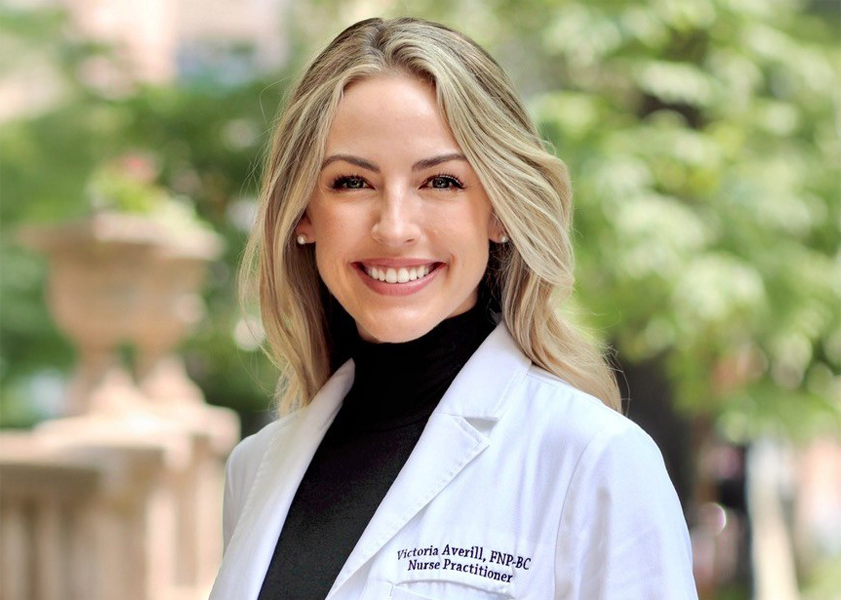The Vital Role of the School Nurse in Youth Health Education
Alumna Victoria Averill advocates for school nurses, experts on adolescent risks, to play a pivotal role in shaping teens’ health education.

A Doctoral Project to Address Adolescent Risk
As young people pass rapidly through various developmental stages, they can be especially vulnerable to their social settings and risk behaviors that affect their physical, mental, and emotional well-being. Victoria Averill, who earned her Doctor of Nursing Practice (DNP) degree at Duke University School of Nursing in 2024, says school nurses have a unique view into youth experiences and help shape health education curriculum to better address current trends and risks.
Dr. Averill explains in her published DNP project that today’s youth are facing increased stress and adverse influences. The most recent Youth Risk Behavior Survey (YRBS) found an increase in cyberbullying and alcohol intake, a decrease in physical activity, lack of sexually transmitted infection education, and an overall reduction in mental well-being. Moreover, following the pandemic, nearly half (42.3%) of adolescents report feeling sad or hopeless every day for more than two weeks in a row.
But according to Dr. Averill, registered school nurses are often seen as trusted allies to youth, with their proximity to students and immersion in the school environment providing unique access and expertise.
“Some of the most significant takeaways outlined in my paper were the need for additional education regarding social media and substance use, as identified by the CDC’s Youth Risk Behavior Survey,” said Dr. Averill. “School nurses’ clinical expertise and unique insight into adolescent health risks make them uniquely positioned to be essential partners in planning school health education.”
School-based health education is required in most states and generally covers topics such as growth and development, nutrition, exercise, sleep, relationships, and risk reduction regarding smoking, vaping, or using illicit substances. Health education standards are typically reevaluated every 10 years.
However, Dr. Averill points out that a comprehensive assessment would ideally take place every three years in between YRBS survey cycles. School nurses, she says, can lead school health education teams in conducting more frequent evaluations using tools provided by the CDC.
“By combining their unique expertise with standardized feasibility and evaluation tools, schools can ensure curricula are relevant, evidence-based, and adaptable to changing student needs,” said Dr. Averill. “This integration strengthens program credibility, sustainability, and effectiveness in improving student outcomes.”
How the Duke DNP Opened Doors
As a DNP student, Dr. Averill was drawn to her project after serving as a consultant for a local health education center in Durham to evaluate their programming—an arrangement facilitated by Anne Derouin, DNP, APRN, CPNP, PMHS, ANEF, FAANP, Professor at the School of Nursing and Vice Dean of Academic and Student Affairs.
“The needs of the youth in our community led me to my topic,” said Dr. Averill. “I hoped to learn about and establish current trends to address vital concerns."
Now living in New York City, Dr. Averill is leading a team of Nurse Practitioners as Clinical Advanced Practice Provider Director at Pod Health. She is currently pursuing her Executive MBA/MS in Healthcare Leadership at Cornell University and will graduate in May 2026.
“My DNP program exposed me to exceptional leaders in nursing who helped catapult me to where I am today,” said Dr. Averill. “Attending Duke was truly one of the best decisions of my life.”
“Since graduation, the strength of the Duke University School of Nursing alumni network has continued to open doors and provide meaningful connections across healthcare,” Dr. Averill added. “I am deeply grateful for the experience and proud to be a Forever Blue Devil.”

